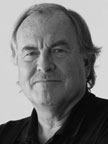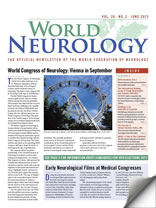Neurology is changing rapidly!
 The spectrum of neurological diseases is undergoing major changes in incidence, spectrum and therapeutic options. There is an increase of neurological diseases in an unprecedented manner all over the world. While infectious diseases are still a major health problem in low and middle income countries, all societies are facing a massive increase of noncommunicable diseases linked to risk factors and aging population.
The spectrum of neurological diseases is undergoing major changes in incidence, spectrum and therapeutic options. There is an increase of neurological diseases in an unprecedented manner all over the world. While infectious diseases are still a major health problem in low and middle income countries, all societies are facing a massive increase of noncommunicable diseases linked to risk factors and aging population.
Neurological services all over the world need to be expanded and health systems have to be prepared for the forthcoming challenges. We need to combine our efforts with our friends and colleagues in the World Brain Alliance, neurosurgeons, psychiatrists, neuroradiologists and child neurologists, to name a few, and our peers in the large neurology specialty societies. Together we can make a difference, and the WFN is the ideal partner for the WHO to lead these efforts.
Background
I was born in post-war Germany in 1948. I received my university training in both psychology and medicine from the RWTH (Technical University) Aachen, Germany. I took my neurology training at the Department of Neurology at the Aachen Medical School under the guidance and leadership of Professor Klaus Poeck, a former vice president of the World Federation of Neurology. I also spend time in Bern, Switzerland, with Professor Marco Mummenthaler. In 1986-1987, I was a visiting professor at the Scripps Clinic and Research Foundation in La Jolla, San Diego, Calif. When I was 38 years old, I was elected chair of the Department of Neurology at the University of Heidelberg, a position that I have held since 1987. I have been on the editorial board of several neurology journals including the Journal of Neurological Sciences and European editor of the Journal Stroke for five years. In addition, to highlight the fact that I represent neurology beyond cerebrovascular diseases, I am the sole author of the leading German neurology textbook “Neurologie,” now in its 13th edition, which I took over from my mentor Professor Klaus Poeck 12 years ago. This has kept me in close touch with general neurology.
Honors
• MD thesis at the Technical University in Aachen (Dr. med.)
• Master of Science in Psychology from the Technical University Aachen (Dipl.-Psych.)
• PhD in Neurology from the Technical University of Aachen
• President of the German Society of Neurology 2001-2003
• Doctor honoris causa from the Georgia State University (DSc (hon))
• Honorary Member of several international and national Neurology and Stroke Societies
• President of the European Stroke Organization (ESO) 2008-2010
• Honorary President of the European Stroke Organization (2012)
• Honorary Professor of the University of Tbilisi, Georgia and of the Universidad los Andes, Santiago the Chile, Chile
International Activities
During the past 25 years, I have devoted much time to international teaching activities. Many delegates will know me from their national or regional neurology and stroke conferences, at which I have had the honor to speak. Under my leadership the Department of Neurology in Heidelberg has hosted more than 200 fellows and exchange scientists from all parts of the world, some of them now in leading positions in their home countries. As the chair of the conference Supervising Committees of both WFN and WSO, I have prepared the biannual sequence of the World Conferences of Neurology (WCN) and helped with the organization of the WCNs in Marrakesh and Vienna, and the World Stroke Conferences in Cape Town, Vienna, Seoul and Brazil.
WFN Activities
My first WFN activity was connected with the WCN 1985, when I was the assistant to the conference president for the Hamburg World Congress of Neurology.
Shortly thereafter, in 1987, I became the founding chair of the Research Group of Critical Care Neurology. I became an elected trustee of the WFN in 2006 and I was elected first vice president of WFN in 2009. I have served as the chair of the Conference Supervising Committee, and in this function, I was involved in the creation of the guidelines for conference site selection and bidding procedures. I am also chair of the Fundraising Committee of the WFN. I support the work of the Brain Alliance with the World Federation of Neurosurgery and Psychiatry and the International Brain Research Organization. I have started the Neurology Specialty Network in which we try to coordinate the activities of WFN and several large international specialty societies such as the World Stroke Organization, the Movement Disorders Society, the international league against epilepsy, child neurology and others.
My Main Objectives
Partnership and Education
I plan to further develop the cooperation with our sister societies and the specialty groups to improve and coordinate educational activities throughout the world, cooperate in conferences and projects, and make brain health and care for neurological diseases a high priority within the WHO and within the health systems of all our membership countries. I also wish to convince more colleagues to actively participate in WFN committees and tasks.
Research and Implementation
Neurological research is of highest quality. We must continue to support science, but we also need to facilitate translation high level of the new finding in clinical practice, knowing that differences in financial resources are a huge obstacle. The implementation of progress in diagnosis and therapy of neurological diseases has been suboptimal even in relatively rich societies. We need to improve our standard of care on all levels and in all societies. We have to continue research for better treatment, but we also have to make available cheap evidence-based approaches for our patients in countries, in which modern medicine can not yet be financed. Custom-made implementation of scientific progress may be achieved by exchange and teaching programs for scientists and physicians.
Advocacy and Public Awareness
We must raise the profile of neurology. Neurology and brain health has never received the attention in the public that it deserves. Considering the amount of funding and public interest that is given to cancer, AIDS and heart disease, we have a long way to go. I will strive to put neurology to the forefront of public awareness and convince decision makers all over that brain health is the most important one, and there is no decent human living without a healthy brain.
